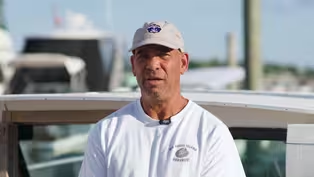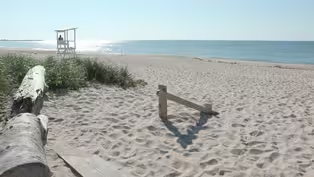
Green Seeker: Declining Bees
Clip: Season 5 Episode 27 | 8m 39sVideo has Closed Captions
Are bees leaving Rhode Island? Local scientists conduct a census examining climate change.
Bees are responsible for a third of the food we eat. But climate change is taking a toll on these powerful pollinators—and some of the 250 species in the Ocean State may be disappearing. At the University of Rhode Island, scientists are conducting a first-of-its-kind census of wild and native bees. Find out what they are doing to help the bees.
Problems playing video? | Closed Captioning Feedback
Problems playing video? | Closed Captioning Feedback
Rhode Island PBS Weekly is a local public television program presented by Ocean State Media

Green Seeker: Declining Bees
Clip: Season 5 Episode 27 | 8m 39sVideo has Closed Captions
Bees are responsible for a third of the food we eat. But climate change is taking a toll on these powerful pollinators—and some of the 250 species in the Ocean State may be disappearing. At the University of Rhode Island, scientists are conducting a first-of-its-kind census of wild and native bees. Find out what they are doing to help the bees.
Problems playing video? | Closed Captioning Feedback
How to Watch Rhode Island PBS Weekly
Rhode Island PBS Weekly is available to stream on pbs.org and the free PBS App, available on iPhone, Apple TV, Android TV, Android smartphones, Amazon Fire TV, Amazon Fire Tablet, Roku, Samsung Smart TV, and Vizio.
Providing Support for PBS.org
Learn Moreabout PBS online sponsorship- I like to tell people that I chase bees for a living.
So, I literally go around with some vials and a net and I go to flowers and net bees and collect them.
- [Pamela] Casey Johnson is busy as, well, a bee collecting these insects.
They're being studied at the Bee Lab on the University of Rhode Island's 85-acre East Farm in Kingston.
With a flick of the wrist she catches the creatures as they flip through the flowers, but these days bees are feeling the sting of climate change.
- Global warming is slowly shifting ranges of certain species of bees.
So, bees might be moving to higher altitudes or higher latitudes as well.
Moving a bit farther north as our climate is warming.
They're declining, not just in general, in relative abundance, but they're also declining in the species richness, which means we're losing species and species ranges are shifting.
We're losing species without even ever really knowing that they've existed in a space.
- [Pamela] Whether they exist or are becoming extinct is the quest of this wide ranging project.
The first bee census taken in Rhode Island.
Johnson and her team spread out in waist-high meadows to discover what breed of bees are buzzing and what flowers are attracting them.
It's to get an historic snapshot of the local bee population.
- [Dr. Alm] These are bees that we've collected over the years as part of the Bumblebee survey and also just a survey of the bees of Rhode Island.
- [Pamela] Dr. Steven Alm is director of the Bee Lab and a URI professor of plant sciences and entomology.
He is curating dozens of trays of bees, some bigger than the top of your thumb, others so minute you could mistake them for a fly, which means it can become a challenge to determine to be or not to be.
Do you sometimes get fooled by the insects?
- Oh yeah, sometimes they're bee mimics.
- [Pamela] How many bees are in Rhode Island?
- 250 plus species.
- You heard right more than 250 and counting in little Rhode Island.
Not only does Alm say he finds them all fascinating.
He says the wild and native variety of bees are vital to the ecosystem and food chain.
Responsible for more than 100 crops we eat and use every day.
Nearly 80% of plants need pollen grains containing reproductive cells to be transferred to male and female parts of the flower.
- Almost a third of our diet is responsible to animal pollinators, mostly bees.
So yeah, it was very important in our diet to have all this variety of fruits and vegetables.
It's pollinating all the native plants and so, that relationship would be lost if we don't have them.
- [Pamela] Alm also says it's critical wild and native bees thrive, because they do something to pollinate plants that honeybees often avoid.
- The honeybees don't like to do this buzz pollination, which is the bee actually grabs onto the flower parts, unhooks their wing muscles, and they vibrate their wing muscles and it's called sonication or buzz pollination.
And it shakes the pollen out of certain flowers like blueberry, cranberry, tomato, eggplant.
- [Pamela] The work to identify and catalog our native bee population is painstaking.
First, they go under the microscope for analysis to determine genus and species.
- Then they've got their tags, they're labeled, where it was collected, the date it was collected, and who collected it, and also who identified it.
We're playing a little catch up here trying to get our checklist of the bees of Rhode Island.
So, researchers in the future can compare what they have, you know, 50, 100 years from now and say, "Yeah, this group is declining or increasing or yeah, hopefully, increasing.
And we don't lose the bees.
- [Pamela] Although through their research they've recorded some are already lost.
- We had 12 species of bumblebees that we knew of before we started this survey.
We were only able to find seven of them.
So, we lost five species of bumblebees.
The number of flowers that they pollinate is enormous.
- He says bees are diminishing for a variety of reasons, pesticides, invasive plants and parasites, but the biggest culprit is global warming.
What is climate change doing to the native bee population?
- Well, you get flowers and the bees out of sync, because maybe the temperatures will force the flowers to come on earlier and the bees aren't quite ready yet.
- [Pamela] The mismatch causes bees to begin foraging when the plants are past prime, starvation can result.
Drought stress can cause a chemical shift reducing the scent that attracts bees to flowering trees and bushes.
Another interruption caused by climate change.
More frequent intense rainstorms affecting the majority of bees who live and raise their young underground.
- We have these flash floods that could be flooding areas where there's ground nesting bees and impacting them, but also having all of this rain leads to limited foraging ability, because the bees don't fly in the rain.
- So, the URI Bee Lab is establishing a new way to support habitat.
What is the project that you're working on that's going to help conserve the bee population?
- Well, I'm actually gonna be working with bumblebee nest boxes, kind of creating them and trying to attract them to live there.
- [Pamela] Ren Johnson, a graduate student says, "Many bees take up residence in abandoned chipmunk or field mice burrows.
These nesting boxes buried in the ground use a rodent aroma to attract the insects and they act much like a birdhouse.
- The actual box we have here is one of 300 boxes around Rhode Island.
We've got the lure compartment here, so that actually houses the chemical lure.
We've got our entrance hole up here and the whole box is sunk underground.
And we've got some nesting material in there that the bees can make their home out of.
- [Pamela] Managed honeybees flourish in hives, because their keepers can add sugar, water, and pollen when flowers are scarce.
Native and wild bees don't have the luxury of such supplements, but there is something you can do.
Expand your garden, more blooms equal more bees.
- Planting a diversity of flowers both in bloom times, so you have things blooming from April all the way down to the fall in October is ideal, and having a variety of flower types.
So, different color flowers.
- Bees prefer yellow, white, and blue native flowers.
You can find suggestions of varieties on the URI Bee Lab website.
With all your years of experience, professor, are you hopeful for the bee population?
- We're seeing more and more people very interested in helping out and doing what they can.
So, yeah, we're very encouraged.
- The word is getting out that these bees are in trouble and that we need to be doing more for them, because we need them all.
Video has Closed Captions
Clip: S5 Ep27 | 4m 27s | Learn all about Rhode Island’s favorite clam. (4m 27s)
Video has Closed Captions
Clip: S5 Ep27 | 11m 11s | Shoreline activists are opposing Weekapaug Fire District in a bitter conflict over beach access. (11m 11s)
Providing Support for PBS.org
Learn Moreabout PBS online sponsorship
- News and Public Affairs

Top journalists deliver compelling original analysis of the hour's headlines.

- News and Public Affairs

FRONTLINE is investigative journalism that questions, explains and changes our world.












Support for PBS provided by:
Rhode Island PBS Weekly is a local public television program presented by Ocean State Media

